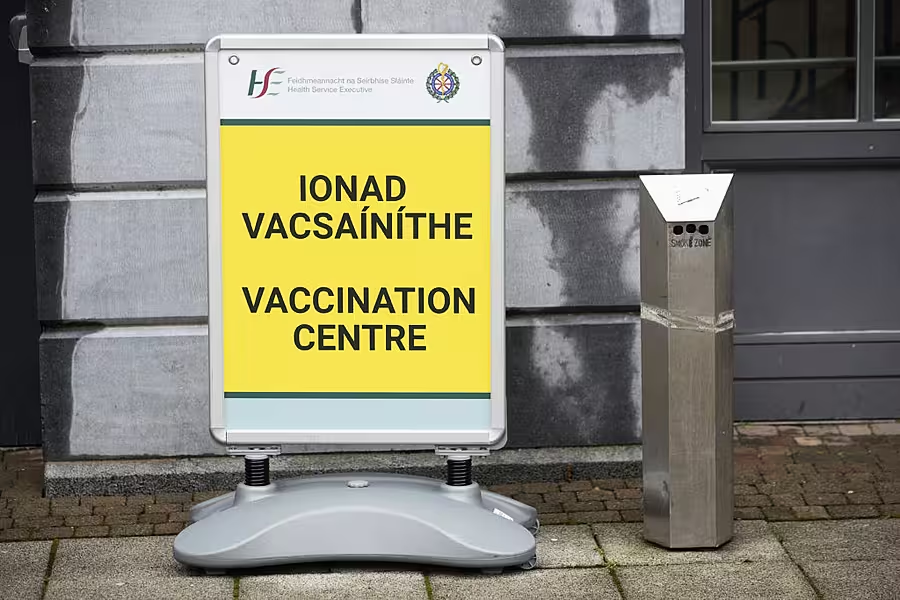
By Cate McCurry, PA
More than 220,000 people aged 60 to 69 have not registered for the Covid-19 vaccine, prompting concerns about vaccine hesitancy.
The online registration process for those aged 60 to 64 opened in the last week, and those aged 65 to 69 started to receive their first dose of vaccine in recent weeks.
The HSE was this week redrawing the vaccine rollout plan following changes in advice from the National Immunisation Advisory Council (Niac).
The Government signed off on a recommendation that the AstraZeneca and Johnson & Johnson (Janssen) jabs be given to over-50s only.

Despite the registration process opening for the 60 to 69 age cohort, a “huge number” of people have not booked an appointment, according to Labour leader Alan Kelly.
“I am concerned that 220,000 people in the 60 to 69 group haven’t registered,” Mr Kelly told the Dáil.
“How are we going to ensure that they do register for vaccines?
“That’s a huge number.
“There is obviously a quantity of people who are not going to register for some reason.
“We need to do something about it.”
Mr Kelly also said the revamped vaccine programme will see over 70s and over 50s vaccinated before those aged 60 to 69.
Currently, people in the 60 to 69 age cohort are being offered the AstraZeneca vaccine, which has a 12-week interval between the first and second dose.
Those aged over 70 will receive their second dose of the Pfizer vaccine in the coming weeks.
Our party leader @alankellylabour has called for the government to put together a strategy to help elderly people reintegrate into the community
This year has had a massive impact on elderly people and the government need a plan to support them 🌹 pic.twitter.com/5IVJxCSrey— The Labour Party (@labour) April 29, 2021
Those in the 50 to 59 age cohort will be given the Johnson & Johnson (Janssen) jabs.
“We all know that there is a plan for a ‘green cert’ to travel,” Mr Kelly added.
“The over 50s will be able to travel, the over 70s will be able to travel but those in their 60s won’t be able to travel.
“It’s discriminatory so how will we deal with that?”
Meanwhile, there have also been calls for a strategy to be published to allow elderly people to integrate back into the community.
Mr Kelly said that a programme should be put in place later this year that would help reignite social interactions between the elderly.

“We should have a month whereby we put in place a programme, whether it’s December or January, that all communities and societies works towards bringing elderly people together, reigniting all that they do and have opportunities in communities,” he added.
“Sporting and community organisations can help out. It will be almost like it’s a restart.
“They have lost so much.”
Meanwhile, Sinn Féin’s Mark Ward has called for a national review over concerns that young people may have been prescribed adult doses of medication at mental health services in Co Kerry.
The HSE is carrying out a local review of files after it emerged that 1,100 children could be effected over a period of four years.
Mr Ward told the Dáil that the recent disclosures are “extremely concerning”.
“The alleged breaches of clinical guidelines in Kerry is such that a national review should be mandated to examine not just a local review as indicated.
“How could this go on for fours years,” he added.
“Immense distress has been caused to children and their families.
“A national is reviewed is needed to determine if this is an isolated incident or a systemic of the system right across the State.”
Mary Butler, Minister of State for Mental Health and Older People, said the HSE review will take 16 weeks, and the findings and recommendations will be published.
She told the Dáil that they will then consider whether a national review is required
Ms Butler also confirmed that new guidance on nursing home visits next month will allow residents to receive four visits every week.
The decision comes after no cases associated with outbreaks in care homes were reported for a third week in a row.













